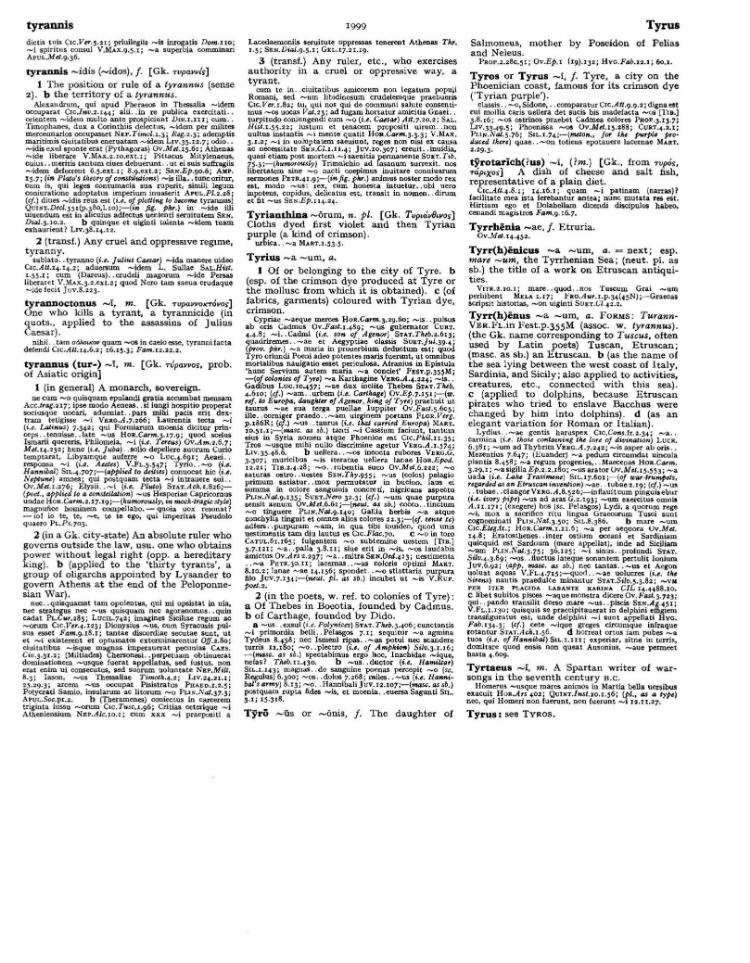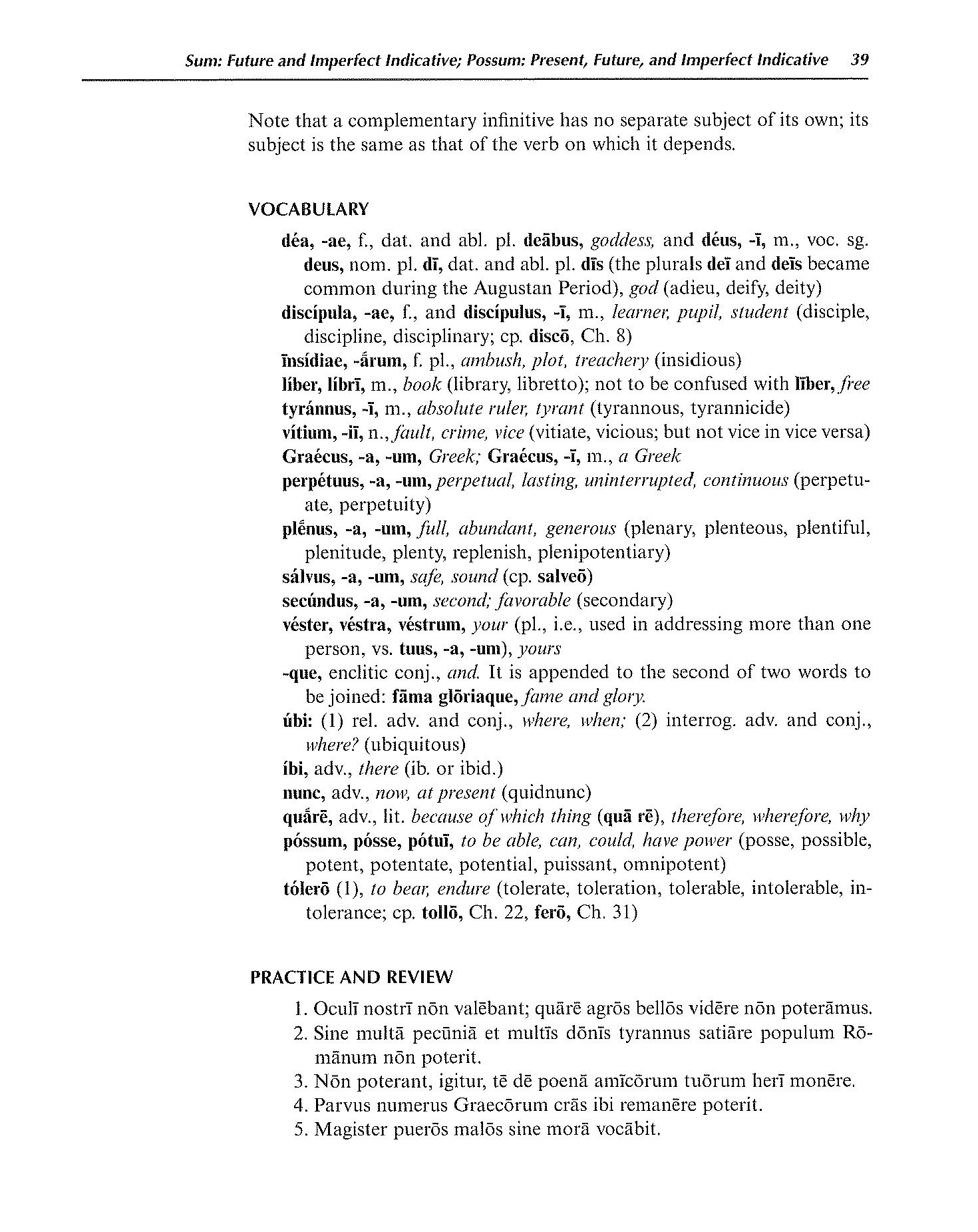
page_listing.tpl
page_subListingDetails.tpl
sub_listingDetails_style1.tpl
sub_listingDetails.title.tpl
tyrannus tyrant
tyrannus is a Latin Noun that primarily means tyrant.
Definitions for tyrannus
Wheelock's Latin
Noun
- 1
absolute ruler, tyrant
English derivatives:
tyrannous tyrannicide
Oxford Latin Dictionary
Noun
- 1
(in general) A monarch, sovereign.
- 2
(in a Gk. city-state) An absolute ruler who governs outside the law, usu. one who obtains power without legal right (opp. a hereditary king). (c) (applied to the 'thirty tyrants', a group of oligarchs appointed by Lysander to govern Athens at the end of the Peloponnesian War).
- 3
(transf.) Any ruler, etc., who exercises authority in a cruel or oppressive way, a tyrant.
Sentences with tyrannus
Latin to English
Dum tyrannus cōpiās dūcit, possumus nihil agere.Compare While the tyrant leads the troops, we can do nothing.
Tyrannus urbem dēlēvit in quam illī novem cīvēs fūgerant.Compare The tyrant destroyed the city into which those nine citizens had fled.
Hāc aetāte spēs nostrae ā hīs tribus tyrannīs tolluntur.Compare In this age our hopes are being destroyed by these three tyrants.
Diū oppressī, sē contrā opprimentem tyrannum vertere coepērunt.Compare Long oppressed, they began to turn themselves against the oppressing tyrant.
At tyrannō expulsō, alius tyrannus imperium saepe accipit.Compare But after a tyrant has been expelled, another tyrant often gets the power.
Cum lībertātem lēgēsque cōnservāre vērē vellent, tamen scelera tyrannī diūtissimē ferenda erant.Compare Although they truly wanted to preserve their liberty and laws, nevertheless the crimes of the tyrant had to be endured very long.
Cum tria bella passī essent, istum tyrannum in exsilium expellere ausī sunt.Compare When they had endured three wars, they dared to force that tyrant into exile.
Imperium istīus tyrannī tantum erat ut senātus eum expellere nōn posset.Compare The power of that tyrant was so great that the senate could not drive him out.
Declension table for tyrannus
Cactus2000
| Singular | Plural | |
| Nom. | tyrannus | tyrannī |
| Gen. | tyrannī | tyrannōrum |
| Dat. | tyrannō | tyrannīs |
| Acc. | tyrannum | tyrannōs |
| Voc. | tyranne | tyrannī |
| Abl. | tyrannō | tyrannīs |
Data sources
Notes
- Definitions
- Frederick M. Wheelock, Wheelock's Latin, 6th ed., rev. Richard A. LaFleur (New York, NY: HarperCollins Publishers, 2005): 39.
- P. G. W. Glare, Oxford Latin Dictionary, Vols. 1-8 (Oxford: Clarendon Press, 1982): 1999.
- Word frequencies
- Louis Delatte, Suzanne Govaerts, Joseph Denooz, and Etienne Evrard, Dictionnaire fréquentiel et index inverse de la langue latine [Frequency Dictionary and Inverse Index of the Latin Language] (Liège, Belgium: Laboratoire d'analyse statistique des langues anciennes de l'Université de Liège [L.A.S.L.A.], 1981): 119-219.
Bibliography
Allen, Joseph H. Allen and Greenough's New Latin Grammar for Schools and Colleges: Founded on Comparative Grammar. Edited by James B. Greenough, George L. Kittredge, Albert A. Howard, and Benjamin L. D'Ooge. Boston, MA: Ginn & Company, 1903.
Crystal, David. A Dictionary of Linguistics and Phonetics. 6th ed. Oxford, UK: Blackwell Publishing, 2008.
Delatte, Louis, Suzanne Govaerts, Joseph Denooz, and Etienne Evrard. Dictionnaire fréquentiel et index inverse de la langue latine [Frequency Dictionary and Inverse Index of the Latin Language]. Liège, Belgium: Laboratoire d'analyse statistique des langues anciennes de l'Université de Liège (L.A.S.L.A.), 1981.
Diederich, Paul B. The Frequency of Latin Words and Their Endings. PhD diss., Columbia University, 1939.
Francese, Christopher. "Latin Core Vocabulary." Dickinson College Commentaries. Last modified 2014. http://dcc.dickinson.edu/latin-vocabulary-list.
Gildersleeve, Basil L., and Gonzales Lodge. Gildersleeve's Latin Grammar: Third Edition, Revised, and Enlarged. 3rd ed. London, England: Macmillan and Co., 1903.
Glare, Peter G.W. Oxford Latin Dictionary. Vols. 1-8. Oxford, England: Clarendon Press, 1982.
Krüger, Bernd. "Latin Conjugation Tables." Cactus2000. Accessed May 5, 2023. https://latin.cactus2000.de/index.en.php.
Pierson, Nick. "Sound of Text." Accessed October 26, 2019. https://soundoftext.com.
Wheelock, Frederick M. Wheelock's Latin. 6th ed. Revised by Richard A. LaFleur. New York, NY: HarperCollins Publishers, 2005.
Wiktionary Contributors. "Victionarium." Wikimedia Foundation, Inc. Updated March 18, 2019. https://la.wiktionary.org/wiki/Victionarium:Pagina_prima.
Citation
Chicago (17th ed.)
Allo Contributors. "tyrannus, tyrannī (n.) - Latin Word Definition." Allo Latin Dictionary. Last modified . Accessed January 30, 2026. http://ancientlanguages.org/latin/dictionary/tyrannus-tyranni.
Entry created on . Last updated on .







